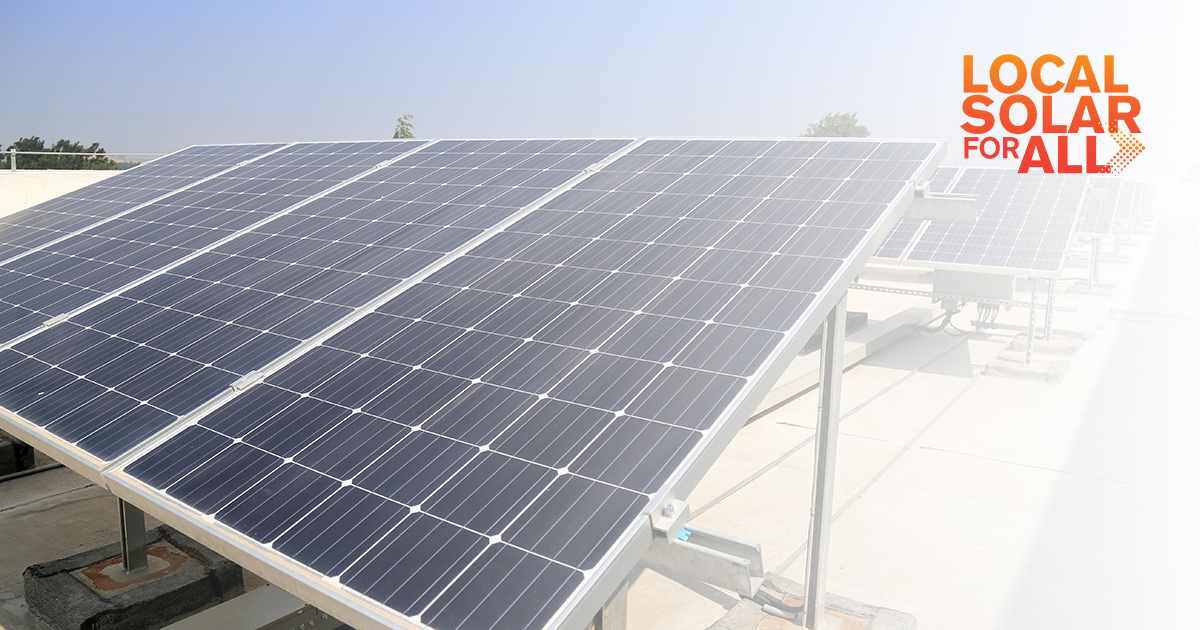Today, a coalition of companies and advocates representing rooftop and community solar has announced the launch of Local Solar for All, a campaign advocating for a more local, clean, and affordable energy grid. Local Solar for All’s mission is to create a safer, more affordable, and more equitable way to supply power to our communities. The campaign is focused on promoting the benefits of local, clean energy production and encouraging federal and state governments to accelerate the development of a more decentralized, distributed energy system.
“We’re here to help policymakers and regulators understand the benefits of distributed resources and speed up the transition to a cleaner, more modern electric grid while maximizing cost-effectiveness and economic opportunity for everyone.”
“When we looked at the energy industry as a whole, we noticed that few outside of academia were promoting the significant value that distributed energy resources bring to the grid, environment, consumers, and local economies,” said Jeff Cramer, Executive Director of the Coalition for Community Solar Access. “We’re here to help policymakers and regulators understand the benefits of distributed resources and speed up the transition to a cleaner, more modern electric grid while maximizing cost-effectiveness and economic opportunity for everyone.”
This campaign will promote the benefits of a more local energy system, including:
- Lower energy bills. Locally produced energy saves homeowners, renters, and businesses money.
- Job creation and economic impact. Local energy creates good-paying jobs in communities across the United States. Local solar also provides economic opportunities for farmers through land leases and provides significant tax revenue to local municipalities, which in turn can fund local public services and infrastructure improvement projects.
- Reduced grid costs. By generating energy closer to the consumer, local solar reduces demand for costly, large-scale utility transmission and distribution infrastructure (“poles & wires”).
- A more resilient grid. Local solar energy, especially when paired with battery storage, will make the electric grid more resilient to weather, climate, and large-scale disruptions. Instead of relying on giant power plants and the poles and wires to transmit power hundreds of miles, a distributed grid of local solar facilities can even out the electric load and reduce outages.
- More consumer access and choice. Millions of Americans want access to solar energy but there are artificial barriers in nearly every market that stifle competition and limit innovation. Increasing access to local solar allows people to take more control of their own electricity and save money on their electricity bills.
- More equitable participation. Everyone with an electric bill can directly participate in and benefit from rooftop and community solar. With intentional action including policy and programming support, local energy includes low-wealth communities who have been most impacted by pollution from traditional power plants.
- Continued innovation. Expanding the electric market beyond traditional utilities creates opportunities for competition, innovation, and more equitable access to the benefits of renewables. This will lead to more efficient products, faster deployment of renewables, increased savings for the customer, and greater economic benefits.
“Low-wealth families and many families of color spend a higher percentage of their income on their electric bill,” said Melanie Santiago-Mosier, Managing Director, Access & Equity at Vote Solar. “With intentional programs and policy support, local rooftop and community solar can have an outsize benefit for these families, lessening the financial burden of life-saving electric service month after month. Our goal in joining Local Solar for All is to ensure these benefits are fully realized by families who, to date, have not had the opportunity to participate.”
The two most shovel-ready forms of local, distributed energy are community solar and rooftop solar, both of which can be paired with battery storage. Community solar, the fastest-growing segment within the solar industry, refers to local solar facilities shared by multiple subscribers who receive credits on their electricity bills for their share of the power produced. Rooftop solar gives people the ability to generate their own power on their own property and potentially store it in a battery for 24/7 resilience even in the event of grid outages. Both rooftop and community solar help customers lower their monthly utility bills.
“Community-based energy solutions, like rooftop solar and community solar, provide cleaner, safer, more affordable, and more equitable power for homes and businesses of every size and income.”
“As the economy suffers from the effects of COVID-19, local energy has proven to help states build up the economy and workforce, creating thousands of jobs and helping to generate billions in private sector investment,” said Evan Dube, Senior Director of Public Policy at Sunrun. “Community-based energy solutions, like rooftop solar and community solar, provide cleaner, safer, more affordable, and more equitable power for homes and businesses of every size and income.”
“Everyone should be able to benefit from solar energy,” said Anya Schoolman, Executive Director of Solar United Neighbors. “Solar owners are eager to help their friends and neighbors benefit from solar energy. We’ll do this by working with policymakers to remove unfair barriers to solar.”
The campaign is being run by solar energy companies, industry groups, and non-profits, including the Coalition for Community Solar Access, Vote Solar, Solar United Neighbors, Sunrun, SunPower, Engie, IGS, and Sunnova.




